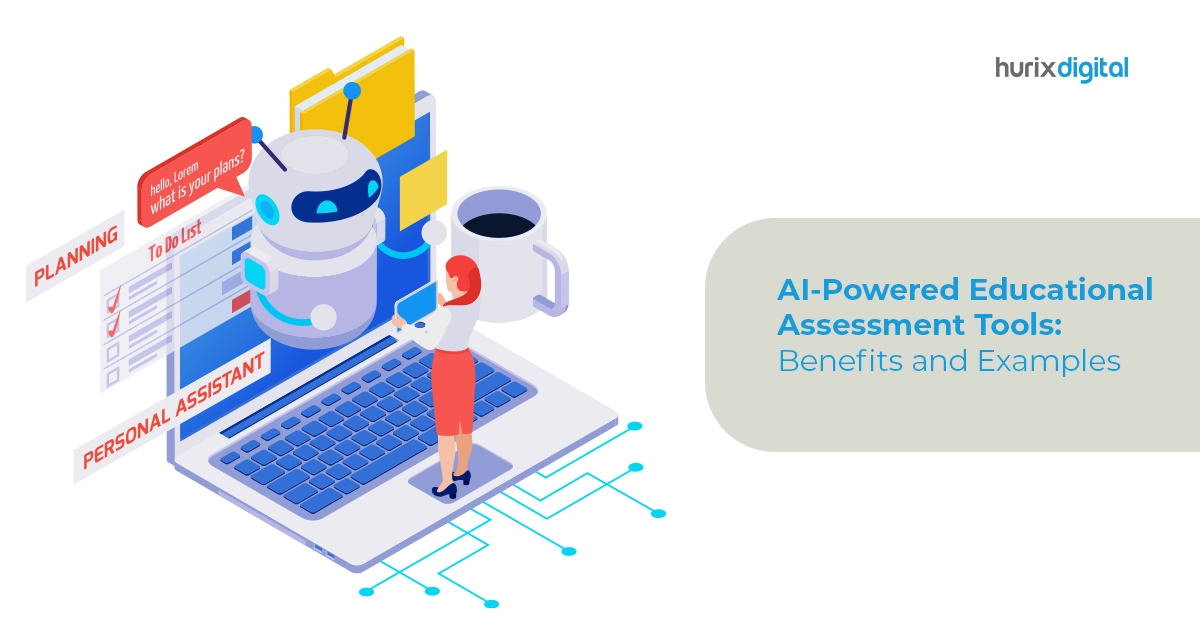
Everything You Need to Know About The Use of AI in Educational Assessment in 2023 and Beyond
Summary
Get insights into the use of AI in educational assessment, including its benefits, challenges, and future developments that are shaping how assessments are conducted and analyzed.
Education and assessment are undergoing a revolution thanks to artificial intelligence (AI), which provides individualized learning paths, objective assessment, increased effectiveness, data-driven insights, adaptive testing, language inclusion, and multimodal evaluations.
Due to the growing trend towards personalized learning, artificial intelligence (AI) in the education market, valued at $4 billion in 2022, is expected to rise at a compound annual growth rate (CAGR) of more than 10% from 2023 to 2032.
From impartial evaluations to personalized feedback, AI in educational assessment leverages the latest technological developments to provide students with efficient learning solutions. This blog outlines the role of AI in educational assessments, benefits, examples, and future trends.
Table of Contents:
- What is AI in Assessment?
- What are the Uses of False Intellect in Educational Assessment?
- Future of AI in Education: How can AI be Used for Hearing and Assessment?
- Takeaway
What is AI in Assessment?
AI can assist educators in developing personalized lesson plans and assessments that align with each student’s particular strengths and limitations by analyzing student performance and preferences data. Better student experiences and motivation can stem from this, eventually boosting academic performance.
For example, Artificial Intelligence (AI) can improve learning through assessment because of its Natural Language Processing (NLP) capabilities. Natural language processing (NLP) makes better voice recognition possible for language learning. This means that oral evaluations can assess a student’s word pronunciation, grammar, and syntax.
What are the Uses of Artificial Intelligence in Educational Assessment?
The assessment of student’s work in higher education could undergo an enormous transformation thanks to artificial intelligence. Here are a few ways through which AI in educational assessment is helping to unlock the potential of learners by providing effective and actionable feedback.
1. AI-Enabled Assessment for Written Assignments
Educational institutions can implement AI-driven grading systems for written assignments; these systems can show remarkable accuracy and give students personalized feedback.
The analysis of essay language, structure, coherence, and argument quality is made possible by natural language processing (NLP) models. Cutting-edge language models such as ChatGPT hold significant potential to improve written assignment evaluation and speed up and improve the grading process in educational organizations.
2. Use of AI in Assessment of Oral Presentations
AI in higher education can be used to evaluate oral presentations. This can produce objective evaluations and helpful feedback for students and instructors alike.
The AI system can assess student oral presentations based on content, organization, and clarity. The system analyzes verbal and nonverbal signs, including tone, tempo, and body language, utilizing machine learning and speech recognition tools to provide valuable insight into presentation skills.
3. AI-Enabled Peer Review to Enhance Mutual Learning
By using AI algorithms to expedite and enable peer assessment, learners can improve the caliber of their work and benefit from mutual learning. The AI system will pair them sensibly for peer review based on each student’s abilities, shortcomings, and goals. It can also offer advice on how to give constructive criticism.
The AI can also monitor the feedback’s accuracy to ensure it is pertinent, precise, and useful.
Additionally, Artificial intelligence-driven peer review tools can assist students in developing the critical thinking, interpersonal interaction, and teamwork skills necessary for achievement in higher learning and beyond by helping them through peer evaluation and pointing out instances in which their input needs to be improved.
4. Gamification in Educational Assessments
One intriguing concept that has gained traction is the application of AI-enabled gamification to educational assessment. Gamification and AI in educational assessment can be combined to improve the learning process further.
Together, these two technologies function quite well. For example, adding leaderboards and other forms of acknowledgment and challenge makes using the AI evaluation methodology much more interesting and competitive for students.
AI is crucial to this process since there is much room for revision in each evaluation, which relies on the learner’s most recent performance. This method accelerates the pace of learning and creates a stimulating and engaging learning environment.
5. Incorporating AI in the Assessment of Creative Endeavors
AI can assess artistic, musical, or design endeavors using sophisticated algorithms examining several aspects of the work. AI systems can objectively evaluate visual art’s uniqueness and aesthetic appeal by examining motifs, colors, forms, and other characteristics.
For instance, when it comes to music, AI can evaluate the composition’s inherent inventiveness and excellence by analyzing its melody, coherence, beat, and orchestration.
Similarly, AI systems can assess the usefulness of a design, its aesthetic appeal, and adherence to design guidelines for design endeavors. AI-powered evaluation systems can assist students in improving their abilities in various areas and foster their creative potential by offering customized feedback depending on the particular creative realm.
Also Read: 5 Ways AI Will Impact Higher Education in 2023 and Beyond
Future of AI in Education: How can AI be Used for Learning and Assessment?
While the use of AI in educational assessment is garnering popularity across the globe, many significant aspects are yet to be explored and made actionable. Here are a few examples of the future scope of AI in assessment.
1. Potential of Adaptive Learning by AI-Enabled Assessment
To create adaptive learning programs that can aid students in learning with greater effectiveness and efficacy, AI algorithms can evaluate data on students’ previous performance.
AI in educational assessment may forecast which sort of assignment could result in focused learning for the pupil by looking at their hobbies, memory retention, job completion percentage, or a range of other data points.
2. Early Detection of At-Risk Learners
Artificial intelligence (AI) systems can identify students who risk falling behind in their studies or quitting altogether by analyzing data on attendance, grades, and other variables. This can assist educators and administrators in stepping in early to offer assistance and keep pupils from getting lost.
3. Frame Adaptive and Personalized Assessment Levels
Using data from students’ answers to assessment questions, AI algorithms can modify the next question’s complexity level, ensuring that every student is properly encouraged to perform the best and evaluated accordingly.
4. Predictive Modeling
AI systems can create predictive models that pinpoint variables that are prone to result in success or failure by using data on previous student performance. To improve educational results, this can assist educators and administrators in making data-driven decisions.
Also Read: AI-Enabled Assessment: Redefining Evaluation in Education
Takeaway
AI in educational assessment presents chances to improve efficiency, deliver prompt feedback, customize learning, and better understand student performance and learning objectives. But it’s crucial to guarantee the moral and responsible application of AI, deal with privacy issues, and keep a balanced strategy that blends AI’s advantages with the knowledge and direction of educators.
If you are looking for AI-powered educational assessment tools for your educational organization, contact Hurix Digital. Our evaluation tools provide an enjoyable learning atmosphere that inspires and involves students.
Additionally, it provides educators with significant insights into their learning habits through actionable data. Using these online tests, students can also examine themselves, determine how well they performed, and make improvements.

Vice President – Digital Content Transformation. He is PMP, CSM, and CPACC certified and has 20+ years of experience in Project Management, Delivery Management, and managing the Offshore Development Centre (ODC).



